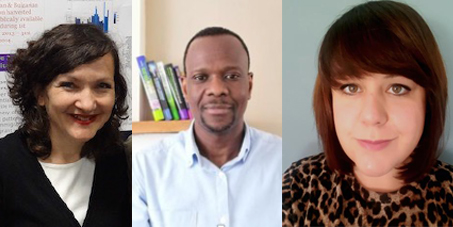Exploring the Black Student Experience

Researchers in the School of Geography & Environmental Science have been awarded a Latitude Prize to lead a cross-Faculty project on the Black student experience in our Faculty. The prize is awarded to those seeking to tackle a pressing education-related challenge which cuts across disciplines. The project is headed by Associate Professor Julie Vullnetari, alongside Dr Booker Ogutu and Dr Eleanor Wilkinson. In this interview Dr Vullnetari tells us a bit more about this project:
What made you decide to do this project looking specifically at the experiences of Black students in our Faculty?
National figures demonstrate that white students are far more likely than Black students to be awarded a first-class undergraduate degree. The Black awarding gap exists across the majority of UK universities. So in part, this project is about trying to address this issue and to work on solutions as to how to eradicate this gap. As what happens is this awarding gap then has a knock-on effect when it comes to Black students progressing on to postgraduate study. Black students are substantially disadvantaged when it comes to accessing research funding for postgraduate study. There’s a really important recent report from ‘Leading Routes’ with research highlighting that only 1.2% of all studentships awarded by all UK Research Councils went to Black or Black Mixed students. These figures are really shocking!
So is the project looking specifically at why Black undergraduate students often don’t progress to postgraduate study?
Yes, we’re looking at something called the ‘broken pipeline’. The numbers of Black students studying at undergraduate level are often increasing, but at postgraduate level there’s little change and the numbers remain really low.
So what impact does this under-representation of Black postgraduate students have later down the line?
If there are very few Black postgraduate students then it means very few Black students will be progressing into academic careers. In the UK there is a stark under-representation of Black staff in higher education. Recent data from the Higher Education Statistics Agency (HESA) revealed that in the UK just 1% of professors are Black. What this means is that often undergraduate students have few role models to look up to, and people who can mentor them, when progressing through their education.
So what will the project do?
The project is founded upon the principles of something called ‘participatory action research’ — where those who are being researched become active agents in shaping and designing the research project. We are currently advertising for Black/Black-mixed students to apply for paid positions as Junior Research Fellows on this project. We feel this is important as this will help avoid some of the hierarchies involved in researching marginalized groups, and also for ensuring that these students get credit and recognition for the important contributions they will be making to the project. By having paid student-researchers we recognise the labour they will put into this project.
What methods will you use?
The project will consist primarily of student discussion forums. However, we envision these to not just be a way to gather data, but a form of peer mentoring, particularly as a way to put students from different study levels in contact with each other—as we’ll be bringing our undergrads together with our fantastic Black postgraduate researchers! The project will close with a Faculty event sharing the results of the findings, with student speakers, and external speakers. We’ll also be running a separate closing mentoring event for Black students in the Faculty, as we really want those who take part in the research to get something back from being involved.
Ultimately, we hope the project will result in a positive change to the experiences of Black students in our Faculty, and that of future cohorts.